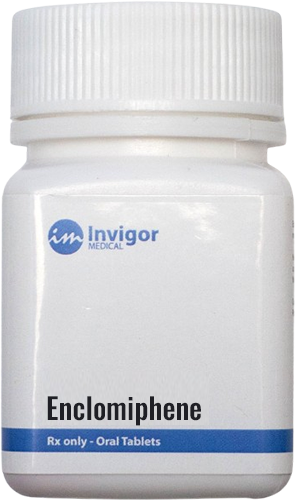Up to five million men in the U.S. have low testosterone levels. Low testosterone levels, or hypogonadism, can cause sexual, psychiatric, and physical symptoms, but research suggests that only one in every 20 men with low testosterone levels seeks treatment.1,2
Testosterone replacement therapy (TRT) has been available for decades, but it decreases sperm production and fertility. This is a hard stop for men wanting to father children in the near future. TRT can also cause testicular shrinkage, mood changes, and severe acne.
Enclomiphene citrate offers an alternative approach. It helps boost testosterone levels naturally by stimulating the body’s own hormone production rather than replacing it. By working with your body’s natural feedback loops, enclomiphene typically has fewer health risks and side effects compared to traditional testosterone therapy.
Table of Contents
How does enclomiphene work to increase testosterone levels (according to studies)?
Yes, enclomiphene citrate is an off-label treatment for low testosterone. It is one of the two isomers found in Clomid (clomiphene), a medication that has been commercially available since the 1960s. The other isomer in Clomid is zuclomiphene.2

How does enclomiphene work to increase testosterone?
When testosterone levels rise, the enzyme aromatase converts some testosterone to estrogen. Aromatase activity is higher in fat tissue. Elevated estrogen levels then suppress the release of follicle-stimulating hormone (FSH) and luteinizing hormone (LH) from the pituitary gland—two hormones critical for sperm and testosterone production.
Enclomiphene citrate acts as a selective estrogen receptor modulator (SERM). It binds to estrogen receptors in the pituitary gland, preventing estrogen from attaching and blocking its feedback suppression. As a result, LH and FSH levels increase, stimulating the testes to produce more testosterone and maintain sperm production.³
In essence, enclomiphene decreases estrogen’s inhibitory effects while promoting natural testosterone synthesis.
What the Research Shows
In two simultaneous Phase 3 clinical trials, 256 adult men with low testosterone levels (two morning readings below 300 ng/dL) and who were either overweight or obese were randomly assigned to receive enclomiphene (6.25 mg or 12.5 mg), testosterone (Androgel), or placebo daily for six weeks.
Results:4
- Testosterone levels increased in the enclomiphene and testosterone groups, but not in the placebo group.
- LH increased in the enclomiphene groups and decreased in the testosterone group.
- FSH increased in the enclomiphene groups and decreased in the testosterone group.
- Sperm counts were maintained in the enclomiphene group and decreased in the testosterone group.
- Testosterone level variation throughout the day was maintained in the enclomiphene groups but not in the testosterone group.
These results highlight that enclomiphene stimulates pituitary function and preserves fertility, while TRT suppresses it.⁴
Other studies have shown consistent findings comparing enclomiphene to both testosterone and Clomid.⁵ ⁶ ⁸

How long does it take for enclomiphene to work?
In a Phase 2 study, researchers monitored testosterone and LH levels every hour in 42 men with hypogonadism who took either enclomiphene or transdermal testosterone for six weeks.
Men with very low baseline testosterone experienced significant increases within two weeks of starting enclomiphene. Average testosterone levels continued to rise through week six and remained elevated for at least one week after stopping treatment.⁷
While individual results may vary, most men begin noticing testosterone-related benefits—such as improved energy, libido, and mood—within a few weeks.⁹
| Benefits of Testosterone Replacement | Estimated Time to See This Effect |
|---|---|
| Increased insulin sensitivity | a few days |
| Improved libido and erectile function | 3 to 6 weeks |
| Increased energy, mood, and vitality | 3 to 6 weeks |
| Increased lean body mass | 12 to 16 weeks |
| Reduced abdominal fat mass | 12 to 16 weeks |
| Increased bone density | 6 months |
| Increased muscle strength | 12-16 weeks |
| Reduced blood glucose | 3 to 12 months |
How much can enclomiphene increase testosterone levels?
Larger studies are needed to fully quantify the testosterone increase from enclomiphene, but early data are promising.
In a Phase III trial of 256 men, testosterone levels below 300 ng/dL at baseline increased to about 400 ng/dL after two weeks and stabilized around 450 ng/dL thereafter.⁴
In a Phase II study of 48 men, baseline testosterone levels were below 350 ng/dL. After six weeks, average levels rose to 604 ng/dL with enclomiphene and 500 ng/dL with testosterone.⁷

What should I expect when taking enclomiphene?
Men with low testosterone levels who are good candidates for enclomiphene therapy should have an increase in their testosterone levels.
Low testosterone levels can cause the following symptoms:
- Decreased sex drive
- Decreased sperm count
- Erectile dysfunction
- Loss of muscle mass and strength
- Increased abdominal fat
- Decreased energy levels
Enclomiphene therapy can reverse many of these symptoms while maintaining natural fertility.
Common side effects include:11
- Headache (3.3%)
- Hot flushes (1.7%)
- Muscle spasms/joint pain (1.2%)
- Nausea (2.1%)
- Cold symptoms (1.7%)
- Diarrhea (1.9%)
Contraindications and Safety Considerations
While enclomiphene is generally well-tolerated, it is not appropriate for everyone. Medical supervision is essential before beginning therapy.
Enclomiphene should be avoided or used with caution in individuals with:
- A history of blood clots (deep vein thrombosis, pulmonary embolism)
- Active or past liver disease
- Prostate cancer or unexplained prostate abnormalities
- Pituitary or hypothalamic disorders affecting hormone regulation
- Uncontrolled cardiovascular conditions
High-dose therapy or unsupervised use may increase the risk of hormonal imbalance or other complications. For this reason, enclomiphene should always be prescribed and monitored by a qualified healthcare provider who can regularly evaluate hormone levels and overall health.
Does enclomiphene cause muscle growth?
Yes—indirectly. By restoring testosterone levels through natural hormonal pathways, enclomiphene can promote muscle mass and strength gains similar to those achieved with testosterone replacement therapy, while helping preserve fertility.
Talk with a treatment specialist at Invigor Medical to learn more about enclomiphene therapy. After a consultation and lab work, men with symptomatic low testosterone may be eligible for prescription enclomiphene treatment—a safe, effective, and fertility-preserving alternative to traditional TRT.












